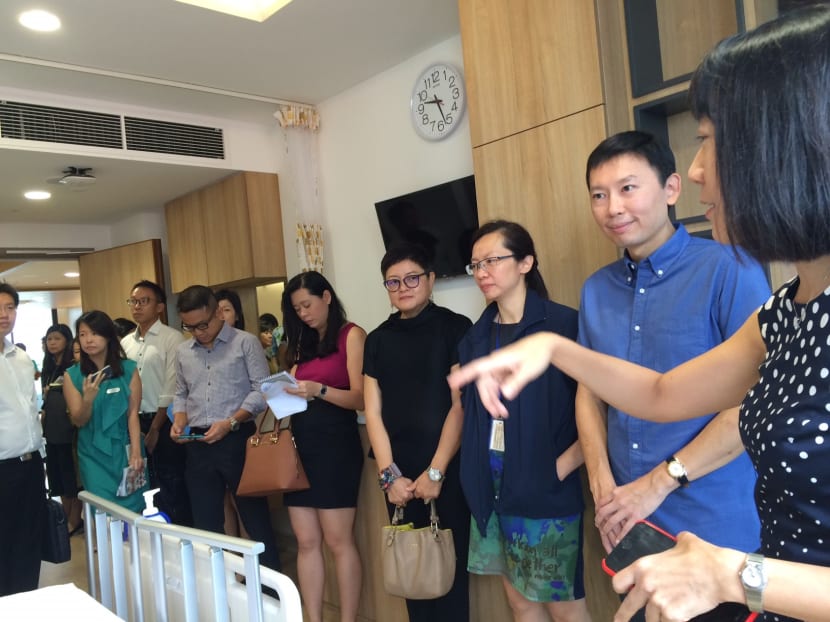More inpatient beds, expanded services to boost end-of-life care
SINGAPORE — The palliative care sector will be given a boost this year, with the Government looking at raising standards, working in partnership with providers and patients and ensuring providers get enough funding support.

Minister of State for Health Chee Hong Tat on a visit to Assisi Hospice on Wednesday, Feb 15, 2017. Photo: Neo Chai Chin
SINGAPORE — The palliative care sector will be given a boost this year, with the Government looking at raising standards, working in partnership with providers and patients and ensuring providers get enough funding support.
Details of the measures will be announced at the Ministry of Health’s (MOH) Committee of Supply debate next month.
The authorities are on track to expand the number of inpatient beds for palliative care to 360 by 2020, said Minister of State for Health Chee Hong Tat, who was speaking to reporters during a visit to Assisi Hospice on Wednesday (Feb 15).
There are about 230 inpatient beds for palliative care now — including 85 at Assisi Hospice’s new premises along Thomson Road.
Last month, the hospice moved its patients from its old building next door, which had 37 beds.
Home palliative care and day hospice services will also be expanded, said Mr Chee.
There are also plans to raise the capabilities of palliative care professionals, and the MOH will be working closely with the Singapore Hospice Council and providers in the next few years to attract more Singaporeans into the sector, he said.
Assisi Hospice chief executive Choo Shiu Ling said: “To support a person in end-of-life, you need a whole team of professionals.”
They include palliative care physicians, nurses, social workers, pastoral care staff and music and art therapists.
Understanding of the psychosocial aspects of care is critical, said Ms Choo. The hospice is ramping up its staff strength and aims for the new facility to be fully functional by the end of this year.
The waiting time for admission to the hospice now is about two weeks, and the average length of inpatient stay is 22 days.
Whether the authorities’ targeted number of hospice beds is sufficient also depends on “how good our home care services and community support is”, said Ms Choo.
She felt that the MOH and Agency for Integrated Care are already doing a “good job” in funding the sector, but more can be done for specific programmes.
“To support a patient in the home environment, it’s not just having doctors and nurses, it’s providing funding for psychosocial support … This could involve, for example, better transport services to various support facilities, family service centres, activity centres.
“It’s to ensure that the patient who is not well and not physically comfortable is able to exist as normally as possible,” she said.
Assisi Hospice serves about 200 home care patients at any one time, and the service requires nursing staff who are able to manage patients with difficult symptoms in a home setting.
Its new premises, which will enable it to serve more than 2,000 patients in various settings a year, will cater to daycare patrons.
Asked if MediShield Life coverage would include care in hospices, Mr Chee said while the Government is mindful of the need to move the healthcare system — including funding support — away from acute services towards community and long-term care, MediShield Life is “just one aspect”.
“We’ll also be providing greater support through subsidies enhancements and also through other types of schemes, for example ElderShield, other types of measures to help patients when they need these services beyond hospital beds,” he said.
MediShield Life is the basic national hospitalisation insurance scheme, while ElderShield is an insurance scheme offering payouts to those with severe disabilities that is currently under review.
The MOH announced its action plan for palliative care in 2014 and some enhancements have been made. For instance, it supported Advance Care Planning, which finds out what patients’ wishes and preferences for care are, while they are able to make those decisions.
So far, about 6,800 clients have had Advance Care Planning discussions with their care teams, the ministry said.






